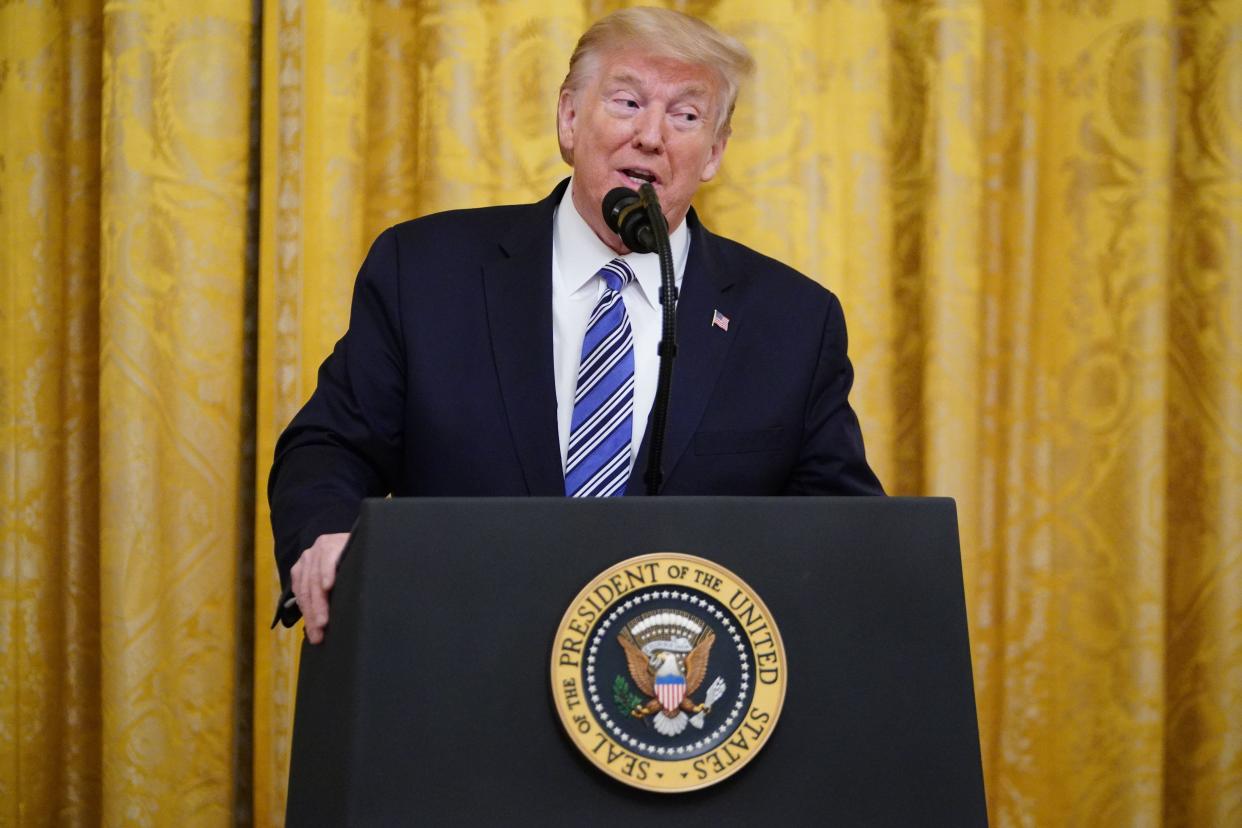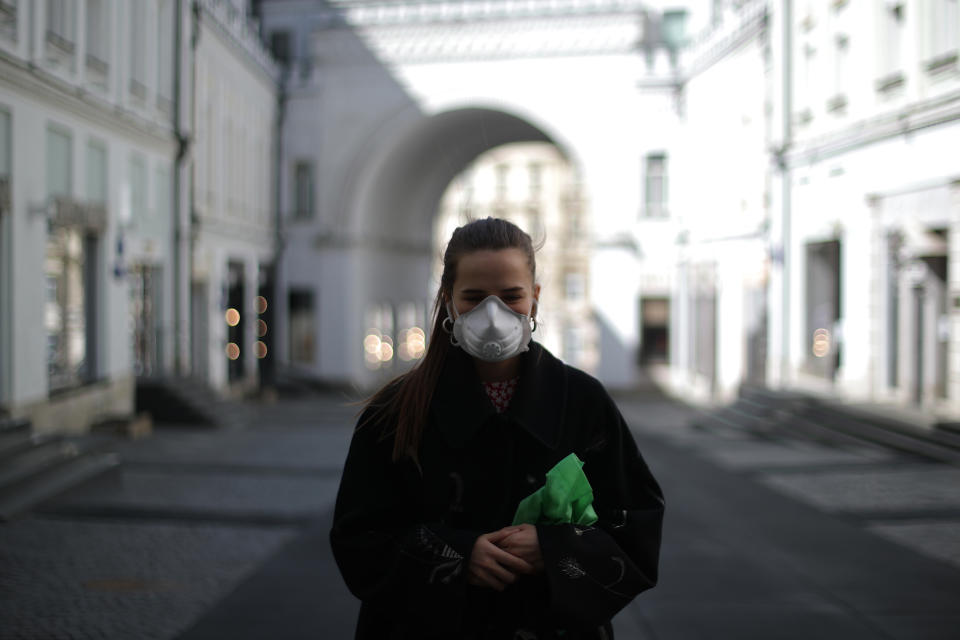Coronavirus: ‘Troublesome’ spike in searches for unproven drugs endorsed by Donald Trump

Scientists have reported a “troublesome” spike in online searches for unproven coronavirus drugs endorsed by president Donald Trump.
With no virus-specific drugs approved by the US Food and Drug Administration, Trump raised hopes when he described the malaria medication chloroquine and arthritis treatment hydroxychloroquine as “something really incredible” on 19 March.
First-time prescription rates for the treatments reportedly soared to 46 times higher than normal.
A chloroquine study in Brazil later had to be cut short when patients developed an irregular heart rate. A hydroxychloroquine trial in US hospitals was even linked to higher death rates.
To better understand how the US public may have been influenced by Trump’s comments, scientists from universities including Oxford and Harvard tracked online searches for the drugs.
Results show searches into buying the treatments rose by up to 1,389%.
Trump later suggested injecting bleach into the body could kill the coronavirus, a comment experts called “disastrous”, “irresponsible” and “a disgrace”.
Early research suggests the infection is mild in four out of five cases, however, it can trigger a respiratory disease called COVID-19.

‘Thousands of Americans were interested in purchasing these drugs’
The scientists analysed Google trends, a public aggregate of the engine’s searches, between 1 February and 29 March.
This covered entrepreneur Elon Musk’s tweet that chloroquine “may be worth considering” on 16 March.
Latest coronavirus news, updates and advice
Live: Follow all the latest updates from the UK and around the world
Fact-checker: The number of COVID-19 cases in your local area
Explained: Symptoms, latest advice and how it compares to the flu
It also included Trump’s praise for the two drugs and the widely-reported fatal chloroquine poisoning on 23 March.
An Arizonian man, reported to be in his sixties, died of a cardiac arrest after taking chloroquine.
Trump had earlier described the drug as a “game changer” in the fight against the coronavirus.
The deceased, whose wife was hospitalised following ingestion of the drug but survived, was not tested for the pathogen.
“We specifically wanted to know if people were looking to buy these drugs, instead of just looking to learn more about them,” said study author Dr John Ayers from The University California, San Diego.
The scientists compared their results with a hypothetical scenario where there were no high-profile endorsements for the drugs, based on historical search trends.
The research – published in the journal JAMA Internal Medicine – revealed searches for chloroquine “purchasing” rose by 442%, while enquiries into sales for hydroxychloroquine went up a staggering 1,389%.
On March 29 – after the fatal poisoning – searches for chloroquine and hydroxychloroquine were 212% and 1,167% higher, respectively, than expected.
“In absolute terms, we estimate there were more than 200,000 total Google searches for buying these two drugs in only 14 days following high-profile endorsements,” said Dr Mark Dredze from John Hopkins University.
“This could be evidence that thousands of Americans were interested in purchasing these drugs.”
Maybe worth considering chloroquine for C19 https://t.co/LEYob7Jofr
— Elon Musk (@elonmusk) March 16, 2020
‘You can’t quickly put humpty dumpty back together again’
Study author Michael Liu from the University of Oxford has warned Trump’s and Musk’s endorsements are “particularly troublesome” for three reasons.
“First, these treatments have inconclusive clinical efficacy,” he said.
The scientists stressed chloroquine and hydroxychloroquine have only been shown to inhibit the coronavirus in laboratory settings.
“Second, these drugs have potentially fatal side effects,” said Liu.
“Third, chloroquine-containing products such as aquarium cleaner are commercially available to the public without a medical prescription.”
The scientists also worry the public may trust endorsements coming from household names.
“As someone who has been studying health misinformation for years, we usually think misinformation spreads from unreliable health sources, online trolls and bots,” said Dr Dredze.
“It’s rare to have health misinformation coming from such high-profile figures.”
Google has reportedly linked coronavirus-related searches to “evidenced-based resources”.
“This should be expanded to include warnings after searching for potential COVID-19 therapies so people can be directed to reliable information,” said Liu.
“Similarly retailers selling unapproved products that might be linked to use for COVID-19, and marketplaces like Amazon that coordinate these sales, should provide appropriate warnings.”
The scientists noted how eBay removed chloroquine sales from its site.
They have also encouraged high-profile figures to be more cautious of their comments amid the pandemic.
“Our leaders and news makers need to be more mindful of the potential collateral effects of their speech,” said Dr Ayers.
“You can’t quickly put humpty dumpty back together again once you’ve broken him.”
The study is thought to have been carried out before 24 April, when Trump suggested injecting a disinfectant or bleach could kill the coronavirus.
Following widespread criticism, the president claimed he was being sarcastic.
“It would be disastrous to inject bleach or disinfectant into the body,” Professor Kim Barrett from the University of California, San Diego, said at the time.
“In fact, a major medical emergency occurs if people drink bleach.
“It destroys cells that line the mouth, oesophagus and stomach (basically by chemically burning them) and results in bleeding, chest pain, coma and potentially death.”
Professor Alastair Hay from the University of Leeds agreed, adding: “There is a good reason why containers of disinfectant, and bleach in particular, warn about the danger of ingestion: the chemicals are dangerous.
“The hypochlorous acid in bleach burns all tissue with which it comes into contact and causes profound inflammation.
“People who swallow bleach die horribly or are permanently scarred.
“Injections of bleach will not only destroy blood vessels but will impair the body’s natural defences.
“President Trump’s musings about injecting bleach are dangerous, so irresponsible and a disgrace.”

What is the coronavirus?
The coronavirus is one of seven strains of a virus class that are known to infect humans.
Others cause everything from the common cold to severe acute respiratory syndrome (Sars), which killed 774 people during its 2002/3 outbreak.
Since the coronavirus outbreak was identified, more than 3.1 million cases have been confirmed worldwide, according to Johns Hopkins University.
Of these cases, over 947,500 are known to have “recovered”.
Globally, the death toll has exceeded 218,400.
The coronavirus mainly spreads face to face via infected droplets expelled in a cough or sneeze.
There is also evidence it is transmitted in faeces and can survive on surfaces.
Symptoms include fever, cough and slight breathlessness.
The coronavirus has no “set” treatment, with most patients naturally fighting off the infection.
Those requiring hospitalisation are given “supportive care”, like ventilation, while their immune system gets to work.
Officials urge people to ward off the coronavirus by washing their hands regularly and maintaining social distancing.




